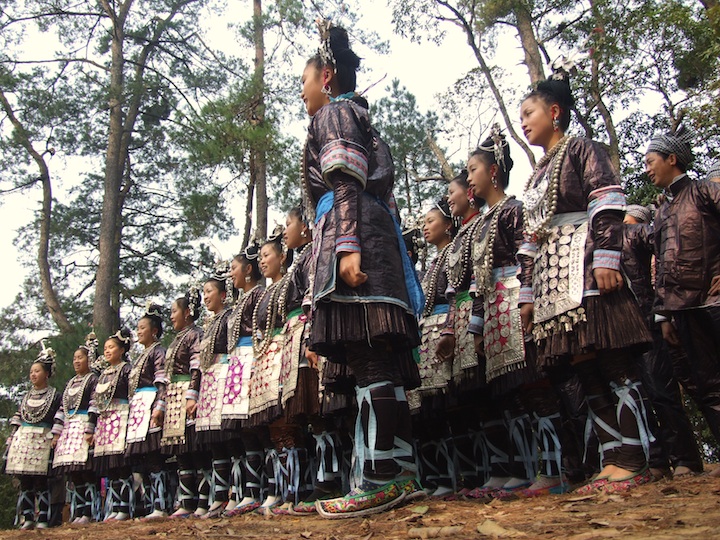

Culture and traditions to help achieve the MDGs

The contribution of the Millennium Development Goals Achievement Fund (MDG-F) was on the agenda as the UN General Assembly on June 12th debated the important role that culture can play in fostering sustainable human development.
The Thematic Debate, with the participation of Secretary-General Ban Ki-moon, UNDP Administrator Helen Clark and UNESCO Director-General Irina Bokova, heard from numerous national government ministers and speakers from key development and cultural organizations about the ways that culture can contribute to international and inter-ethnic understanding, job creation and economic growth and the development of pluralist societies, among other areas.
Ban Ki-moon told the gathering that the MDG-F's work in the area of culture had reached 10 million people around the world.
"New national laws are protecting heritage and promoting cultural diversity. A new global creative economy is emerging. It is generating millions of jobs in tourism, crafts, music, the cinema and creative industries. It is fostering social inclusion and changing mindsets. We must build on these achievements," he said.
With a budget of US $94.5 million, the MDG-F’s Culture and Development thematic window financed and managed 18 joint programmes in Albania, Bosnia and Herzegovina, Cambodia, China, Costa Rica, Ecuador, Egypt, Ethiopia, Honduras, Mauritania, Morocco, Mozambique, Namibia, Nicaragua, the Occupied Palestinian Territory, Senegal, Turkey and Uruguay.
Cross-cultural understanding
The MDG-F works with indigenous and ethnic groups and governments to increase cross-cultural understanding within countries, notably at the community level. These efforts contribute to the Millennium Development Goal of halving the proportion of people whose income is less than $1.00 a day by 2015, giving special attention to the participation of women in these efforts.
"Programmes supported by the MDG Achievement Fund supported tens of thousands of artisans and small tourism operators to develop their markets, improve product design and marketability, and access credit," said UNDP Administrator Helen Clark. "Capacity support was also provided to local and national governments, helping them to generate an enabling environment for cultural and related industries."
In Uruguay, the MDG-F worked with the National Cultural Directorate to support theater, literature, radio, art, photography and lyrical "murga" plays, with a particular focus on the country's prison population, to help soon-to-be-released inmates prepare for life outside the prison walls.
Meanwhile, in Ecuador, culture and ethnic background have caused social rifts, with many of its 14 nationalities and 18 peoples suffering discrimination and exclusion. The MDG-F helped bridge these gaps by encouraging social inclusion and the appreciation of culture through numerous initiatives.
Weavers from 80 families in Nizag, central Ecuador, use wool and sisal -- the main local resource -- to fashion clothes and accessories. The MDG-F-supported project has helped strengthen these artisans' identity and recover ancient knowledge about the cultivation, processing and design of sisal handicrafts.
In the Occupied Palestinian Territory, an MDG-F programme encouraged the development of cultural activities as a way to increase livelihoods and social cohesion; the play "Waiting for Godot" was produced by the Freedom Theatre Acting School, with five young actors from the Jenin refugee camp and support from the MDG-F.
In Mozambique, the MDG-F helped to safeguard the Timbila tradition, a unique cultural expression that was proclaimed a Masterpiece of the Oral and Intangible Heritage of Humanity by UNESCO, by establishing community tree nurseries to re-introduce the Mwendje tree, whose wood is one of the main materials used in the production of the Timbila instrument. This activity involves the producers and players of the Timbila in collecting seeds for the propagation of the tree, which takes 50-60 years to mature.
National plans
The MDG-F’s Culture and Development thematic window supported the formulation or implementation of 26 national laws, 21 national plans and 78 local plans that explicitly aim to mainstream cultural diversity and strengthen national and local government capacity.
At least 565,718 citizens have been affected directly by these laws, policy or plans. In 14 countries, the MDG-F’s programmes improved access to new markets for producers of cultural and/or touristic services or products, benefiting almost 11,200 citizens, including culture professionals, artists, artisans and tourist service providers.
The MDG-F’s culture programmes have had a positive impact on the health, security and income of more than 25,500 people, of which nearly 10,000 are entrepreneurs and nearly 12,000 work in the cultural industries sector.
Across programmes, the interventions improved the capacities (through training, equipment and knowledge transfer) of 1,445 public institutions and 545 private sector institutions. In addition, at least 14,198 civil servants took part in training programmes aimed to increase institutional capacities.
More than 80% of the programmes worked to renovate or build a total of 124 units of cultural infrastructure, serving an estimated 2.3 million citizens.
"This experience has been extremely positive in terms of impact on the ground," said UNESCO Director-General Irina Bokova. "[These programmes] have provided clear evidence that culture is a key enabler of sustainability, and contributes to development through social inclusion and poverty reduction."